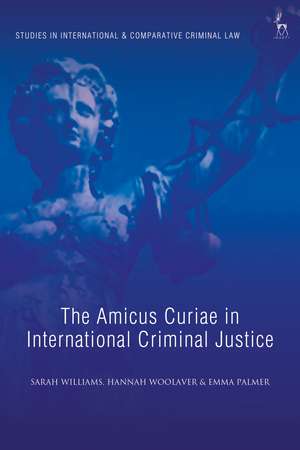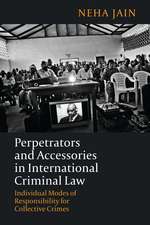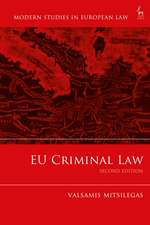The Amicus Curiae in International Criminal Justice: Studies in International and Comparative Criminal Law
Autor Sarah Williams, Dr Hannah Woolaver, Emma Palmeren Limba Engleză Hardback – 5 feb 2020
| Toate formatele și edițiile | Preț | Express |
|---|---|---|
| Paperback (1) | 302.99 lei 43-57 zile | |
| Bloomsbury Publishing – 25 aug 2021 | 302.99 lei 43-57 zile | |
| Hardback (1) | 573.63 lei 43-57 zile | |
| Bloomsbury Publishing – 5 feb 2020 | 573.63 lei 43-57 zile |
Din seria Studies in International and Comparative Criminal Law
- 30%
 Preț: 897.55 lei
Preț: 897.55 lei - 21%
 Preț: 275.26 lei
Preț: 275.26 lei - 18%
 Preț: 358.30 lei
Preț: 358.30 lei - 30%
 Preț: 540.65 lei
Preț: 540.65 lei - 27%
 Preț: 345.42 lei
Preț: 345.42 lei - 28%
 Preț: 465.96 lei
Preț: 465.96 lei - 27%
 Preț: 442.83 lei
Preț: 442.83 lei - 27%
 Preț: 501.70 lei
Preț: 501.70 lei - 14%
 Preț: 603.73 lei
Preț: 603.73 lei - 14%
 Preț: 509.52 lei
Preț: 509.52 lei - 24%
 Preț: 374.34 lei
Preț: 374.34 lei - 11%
 Preț: 374.34 lei
Preț: 374.34 lei - 30%
 Preț: 779.33 lei
Preț: 779.33 lei - 30%
 Preț: 774.62 lei
Preț: 774.62 lei - 30%
 Preț: 893.89 lei
Preț: 893.89 lei - 24%
 Preț: 190.33 lei
Preț: 190.33 lei - 30%
 Preț: 570.02 lei
Preț: 570.02 lei - 18%
 Preț: 302.99 lei
Preț: 302.99 lei - 18%
 Preț: 297.86 lei
Preț: 297.86 lei - 18%
 Preț: 319.86 lei
Preț: 319.86 lei - 30%
 Preț: 603.81 lei
Preț: 603.81 lei - 30%
 Preț: 718.27 lei
Preț: 718.27 lei
Preț: 573.63 lei
Preț vechi: 818.77 lei
-30% Nou
Puncte Express: 860
Preț estimativ în valută:
109.76€ • 114.91$ • 90.82£
109.76€ • 114.91$ • 90.82£
Carte tipărită la comandă
Livrare economică 07-21 aprilie
Preluare comenzi: 021 569.72.76
Specificații
ISBN-13: 9781509913329
ISBN-10: 1509913327
Pagini: 424
Dimensiuni: 156 x 234 mm
Greutate: 0.77 kg
Editura: Bloomsbury Publishing
Colecția Hart Publishing
Seria Studies in International and Comparative Criminal Law
Locul publicării:London, United Kingdom
ISBN-10: 1509913327
Pagini: 424
Dimensiuni: 156 x 234 mm
Greutate: 0.77 kg
Editura: Bloomsbury Publishing
Colecția Hart Publishing
Seria Studies in International and Comparative Criminal Law
Locul publicării:London, United Kingdom
Caracteristici
Examines how the concept of amicus curiae operates in international criminal law proceedings
Notă biografică
Sarah Williams is Professor at the Faculty of Law, UNSW Sydney.Hannah Woolaver is an Associate Professor at the Faculty of Law, University of Cape Town.Emma Palmer is a Lecturer at Griffith Law School, Griffith University.
Cuprins
1. International Criminal Tribunals, Legitimacy and the Amicus Curiae I. Introduction II. Why International Criminal Tribunals? And Which Ones? III. Legitimacy in International Criminal Justice IV. Legitimacy and the Amicus Curiae V. Method and Chapter Overview 2. The Amicus Curiae in Comparative Perspective I. Adopting a Functional Approach II. Standing to Bring a Claim III. Joinder of Claims and Cases IV. Intervention V. The Amicus Curiae: A Friend of the Court VI. Relevance of Comparative Practice to International Criminal Tribunals 3. The Amicus Curiae in International Criminal Tribunals: An Introduction I. Overview II. Standing in International Criminal TribunalsIII. History of Amicus Curiae Participation in International Criminal Tribunals IV. The Amicus Curiae Prosecutor and the Prosecutor as Amicus Curiae V. Limits on Amicus Curiae Participation VI. The Amicus Curiae and Other Mechanisms for Expertise, Representation and Communication VII. Conclusion 4. The Amicus Curiae in International Criminal Tribunals in PracticeI. Introduction II. Who Can Participate as an Amicus Curiae? III. When Can an Amicus Curiae Participate?IV. How do Amici Curiae Participate? V. Substantive Criteria for Admitting Amici Curiae VI. Impact of Amicus Curiae Submissions VII. Participation in ICC Reparations Proceedings VIII. Conclusions 5. Civil Society Actors as Amici Curiae I. Introduction II. Overview of Civil Society Actors at International Criminal Tribunals III. The Expertise Function and Civil Society Actors IV. Representation of Interests by Civil Society as Amici Curiae V. The Communicative Function and Civil Society VI. Impact of Civil Society Amicus Curiae Submissions VII. Conclusion 6. The Amicus Curiae and the Defence I. Introduction II. Overview of Defence Amicus Curiae Practice III. The Defence and the Provision of Expertise through the Amicus Curiae IV. The Use of the Amicus Curiae to Represent the Interests of the DefenceV. The Communicative Function and the Defence VI. Conclusion 7. Representing State Interests I. Introduction II. Overview of State and International Organisation Amicus Curiae Practice III. State and International Organisation Amici Providing Expertise IV. The State or International Organisation Amici Representing an Interest V. State Amici Performing a Communicative Function VI. The Challenge of Engaging Reluctant or Resistant States VII. Conclusion 8. Conclusion
Recenzii
The exploration of legitimacy throughout the text is highly effective . the authors' decision to adopt both an analytical and normative approach to the role of the amicus means that the text functions at multiple levels of usefulness to academia and practitioners alike.









